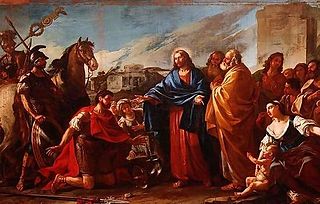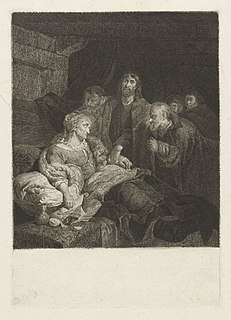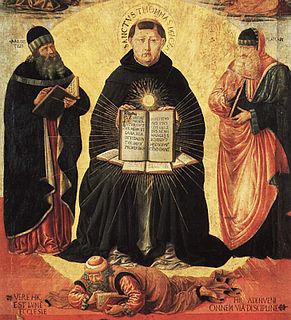Word of Faith is a worldwide Christian movement which teaches that Christians can access the power of faith through speech. Its teachings are found on radio, the Internet, television, and in many Charismatic denominations and communities. The movement renounces poverty and physical suffering as either necessary to a godly life or glorifying Jesus Christ. It teaches that the salvation won by Jesus on the cross included wealth and prosperity for believers.

Matthew 1:23 is the 23rd verse of the first chapter in the Gospel of Matthew in the New Testament. Joseph has just been informed of the nature of Jesus by an angel and in this verse the author of Matthew relates this to a quote from the Old Testament.

Matthew 2:23 is the twenty-third verse of the second chapter of the Gospel of Matthew in the New Testament. The young Jesus and the Holy Family have just returned from Egypt and in this verse are said to settle in Nazareth. This is the final verse of Matthew's infancy narrative.

Matthew 3:3 is the third verse of the third chapter of the Gospel of Matthew in the New Testament. The verse occurs in the section introducing John the Baptist. This verse links John The Baptist to messianic prophecies.

Matthew 3:6 is the sixth verse of the third chapter of the Gospel of Matthew in the New Testament. The verse occurs in the section introducing John the Baptist with this verse describing his baptisms.

Matthew 3:9 is the ninth verse of the third chapter of the Gospel of Matthew in the New Testament. The verse describes an incident where John the Baptist berates the Pharisees and Sadducees. He has previously called them a brood of vipers and warned them of the wrath to come and has urged them to repent. In this verse he warns that their links to Abraham will not save them.

Matthew 3:11 is the eleventh verse of the third chapter of the Gospel of Matthew in the New Testament. The verse occurs in the section relating the preachings of John the Baptist. In this verse he predicts that he will be followed by someone much greater than himself. The main theme of this verse is that John will soon be supplanted by a much greater figure and that John's water baptism is just a preparation for the much greater baptism by fire and spirit that will occur under the second coming of the Christian messiah Jesus, an original Christian concept that, according to Jewish scholars, lacks any fundament in the Hebrew scripture.

Matthew 3:16 is the sixteenth verse of the third chapter of the Gospel of Matthew in the New Testament. Jesus has just been baptized by John the Baptist and in this verse the Holy Spirit comes to him like a dove.

Matthew 4:23 is the twenty-third verse of the fourth chapter of the Gospel of Matthew in the New Testament. Jesus has just recruited the first four disciples, this verse begins a brief summary of and introduction to Jesus' ministry in Galilee that will be recounted in the next several chapters.

Matthew 4:24 is the twenty-fourth verse of the fourth chapter of the Gospel of Matthew in the New Testament. This verse is part of a brief summary of and introduction to Jesus' ministry in Galilee, which will be recounted in the next several chapters. This verse relates Jesus' fame "throughout all Syria" and summarizes his work of healing.

Matthew 5:1 and Matthew 5:2 are the first two verses of the fifth chapter of the Gospel of Matthew in the New Testament. The verses introduce the Sermon on the Mount that will be recited in the next several chapters. The previous verse mentioned the large crowds "from Galilee, and from the Decapolis, Jerusalem, Judea, and beyond the Jordan" who followed Jesus to witness him healing: these verses present Jesus as seeing the crowds and going up onto a mountain to begin teaching.

Matthew 8:6 is the sixth verse of the eighth chapter of the Gospel of Matthew in the New Testament. This verse continues the miracle story in which a centurion's servant is healed, the second of a series of miracles in Matthew.

Matthew 8:14 is the fourteenth verse of the eighth chapter of the Gospel of Matthew in the New Testament. This verse describes the start of Jesus healing Peter's mother-in-law.

Matthew 8:15 is the fifteenth verse in the eighth chapter of the Gospel of Matthew in the New Testament which relates the Healing the mother of Peter's wife.
Matthew 8:22 is the 22nd verse in the eighth chapter of the Gospel of Matthew in the New Testament of the Christian Bible.
Matthew 8:27 is a verse in the eighth chapter of the Gospel of Matthew in the New Testament.

Thomistic sacramental theology is St. Thomas Aquinas's theology of the sacraments of the Catholic Church. It can be found through his writings in the Summa contra Gentiles and in the Summa Theologiæ. As can be seen, Aquinas relied heavily on Scriptural passages, as well as the writings of various Church Fathers. St. Augustine says : "The visible sacrifice is the sacrament. This is the sacred sign of the invisible sacrifice. A thing is called a sacrament, either by having a certain hidden sanctity, and in this sense a sacrament is a sacred secret; or from having some relationship to this sanctity. A sacrament is a sign. Moreover, it is a sacred sign. Divine Wisdom provides for each thing according to its mode. Wisdom 7,1 : "she... ordered all things sweetly"; and from Matthew 25,15: "[she] gave to everyone according to his proper ability." It is a part of human nature to acquire knowledge of the intelligible from the sensible. A sign is the way one obtains knowledge of something else. The sacraments are the signs by which humans gain knowledge of spiritual and intelligible goods. Ephesians 5, 25-26: "Christ loved the Church, and delivered Himself up for it; that He might sanctify it, cleansing it by the laver of water in the word of life." St. Augustine says : "The word is added to the element, and this becomes the sacrament." Augustine : "It is impossible to keep men together in one religious denomination, whether true or false, except they be united by means of visible signs or sacraments." It is necessary for salvation that humans united together in the name of true religion. Therefore, sacraments are necessary for man's salvation. There are three reasons sacraments are necessary to the salvation of humans: First, it is in the nature of humans to be led by things corporal and sensible to things that are spiritual and intelligible. Second, by sinning, humans have subjected themselves to corporeal things. Therefore, it is proper that the remedy have a corporeal side, leading to the spiritual. Third, humans are prone to direct their activity towards material things. Sacraments are made necessary because humans have sinned. The main effect of the sacraments is grace, in particular those involving Virtues and Gifts. Grace perfects the soul and allow participation in the Divine Nature. Furthermore, the effects of the sacraments is justification. This is an interior effect. Romans 8,33: "God justifies." Therefore, the effects of the sacraments is justification. This is an interior effect. The power of the sacraments is from God, alone. It does not matter that the minister of the sacraments may be a sinner, or evil. Augustine : "He upon Whom you shall see the Spirit, ...that John did not know that our Lord, having the authority of baptizing, would keep it to Himself, but that the ministry would certainly pass to both good and evil men...What is a bad minister to you, wherever the Lord is good?"

The healing of the mother of Peter's wife is one of the miracles of Jesus in the Gospels, reported in Matthew 8:14–15, Mark 1:29–31, and Luke 4:38–39.

The synoptic gospels portray Jesus exorcising at sunset just after he had healed the mother of Peter's wife, in Matthew 8:16–17, Mark 1:32–34 and Luke 4:40–41.

John 1:14 is the fourteenth verse in the first chapter of the Gospel of John in the New Testament of the Christian Bible.
















